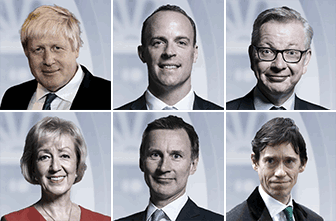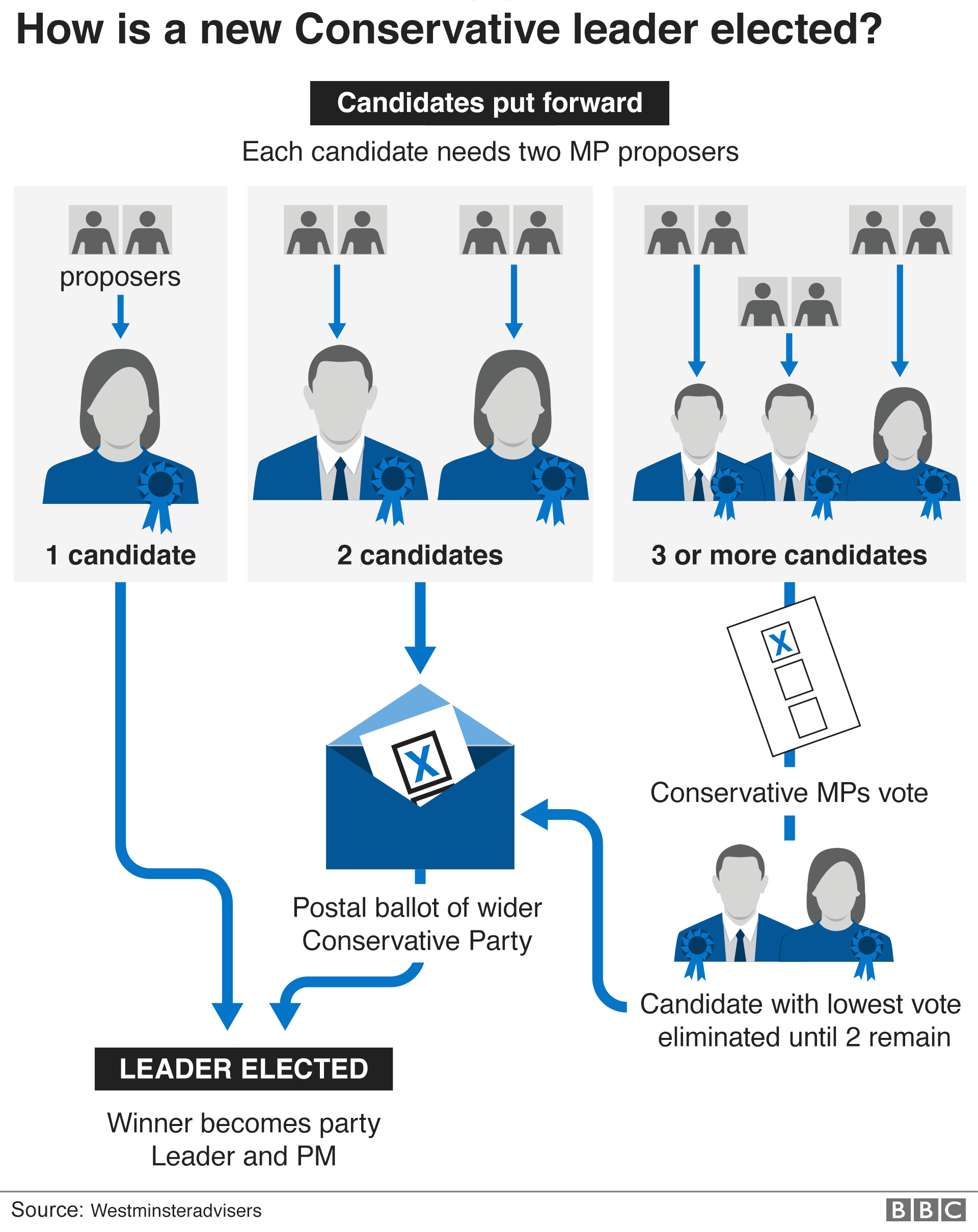Sam Gyimah backs further referendum in Tory leadership bid
- Published
Gyimah: No-deal Brexit "would be abject failure"
Sam Gyimah has become the first Tory leadership candidate to back a further referendum on Brexit.
The former universities minister is the 13th candidate to join the race, which will also choose the UK's next PM.
Mr Gyimah - who quit over Theresa May's Brexit plan - said he would vote Remain in such a poll, but would not "actively campaign" if he became prime minister.
Meanwhile, other contenders to succeed Mrs May have been setting out their Brexit plans.
Former Commons Leader Andrea Leadsom said she would seek a "managed exit" by 31 October - the deadline the EU has set for leaving the bloc.
Andrea Leadsom claims "arrangements" would be put in place, even in a no-deal Brexit scenario
She told the BBC's Andrew Marr Show that Mrs May's negotiated plan was "dead", as the EU would not re-open it and Parliament would not vote for it.
Mrs Leadsom said she would instead introduce legislation to guarantee citizens' rights, ramp up preparations for all Brexit scenarios and explore alternatives to the Irish border backstop plan.
Home Secretary Sajid Javid, who is also running in the Tory leadership race, said he "passionately" wanted to leave the EU with a deal, but it was "responsible" to prepare for a no-deal exit.
His pitch for the top job was a "modern digitised border" between Northern Ireland and the Republic of Ireland, which he said would "unlock a Brexit deal".
Home Secretary Sajid Javid: "Ireland is key... I would renegotiate the backstop"
Appearing on the Andrew Marr Show, Mr Javid said he would try to renegotiate the Irish border backstop plan and offer to pay Ireland for work towards a digital border, saying it was "morally right".
He also said there should not be another general election before Brexit is delivered, but admitted he "may not be able to stop it" if the government were defeated in a vote of no confidence.

Who will replace Theresa May?

The winner of the contest to lead the Conservative Party will become the next prime minister.

Mr Javid is one of the leadership candidates who have said they are prepared to leave the EU without a deal if necessary.
But his rival, Health Secretary Matt Hancock, said leaving without a deal is "not an available choice" to the next PM, as Parliament "will never allow it to happen".
In a letter to MPs, external, he set out his strategy for delivering Brexit, including a pledge to negotiate an "end point" to the backstop plan.
He also says he would unilaterally guarantee the rights of EU citizens, and set up an "Irish Border Council" to explore how technology can be used to avoid a hard border.
Allow X content?
This article contains content provided by X. We ask for your permission before anything is loaded, as they may be using cookies and other technologies. You may want to read X’s cookie policy, external and privacy policy, external before accepting. To view this content choose ‘accept and continue’.

The backstop is a backup plan to maintain an open border on the island of Ireland in case the UK leaves the EU without an all-encompassing deal.
The EU's chief negotiator Michel Barnier has previously insisted the backstop plan would not be renegotiated, saying it is "part and parcel" of the UK's Brexit deal.
On Sunday, Irish European Affairs Minister Helen McEntee said the backstop plan and withdrawal agreement will not be changed.
"Much of what is in the withdrawal agreement was asked for by the UK," she tweeted, external.
"They were not bystanders in the two years it took to negotiate. Bit of realism needed."
'Broaden the race'
Rory Stewart - who has also launched his own leadership bid - said candidates should "stop pretending that there is some different deal out there", and focus instead on getting the current agreement through Parliament.
"There is literally no evidence at all that Europe will give us a different deal", the international development secretary wrote on Twitter, external.
Speaking to BBC News, Mr Gyimah said he was putting himself forward to "broaden the race" for the Conservative leadership.
The East Surrey MP said existing candidates had either been pledging to "reawaken the deal that is dead" or "bunching around" the option of a no-deal exit.
Mr Gyimah quit the government last December over Mrs May's Brexit plan, saying that he intended to vote against the deal and advocate another referendum.
He added that another referendum could be a way to "break through" the impasse in Parliament, although he said that a no-deal Brexit would be an "abject failure".

Who will choose the next PM?
Conservative MPs will take part in a series of votes to narrow down all the candidates to a final two.
These two MPs will then face a vote of the full party leadership.
Most members of political parties in the UK are pretty middle-class, but Conservative Party members are the most middle-class of all: 86% fall into the ABC1 category.
Around a quarter of them are, or were, self-employed and nearly half of them work, or used to, in the private sector.
Nearly four out of 10 put their annual income at over £30,000, and one in 20 put it at over £100,000. As such, Tory members are considerably better-off than most voters.

